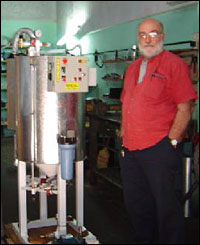Even by Argentine standards, Ricardo Carlstein can talk a blue streak.

Ricardo Carlstein.
I met with the founder of Biofuels SA, an Argentina-based maker of small-scale biodiesel plants, in the posh environs of Buenos Aires. Carlstein sat at his desk and explained how any person can be a fuel plant by using his invention, a technology protocol he calls “high-temperature pressurized” (simply put: a way to cook biofuels at abnormally high temperatures, one that cuts effluence by rendering obsolete the need to “wash” the fuel).
A massive, bearded man in T-shirt, slacks, and New Balance running shoes, he reminded me of my high-school football coach, pointing through charts and graphs, his playbook for debunking South America’s increasingly hyped biofuels revolution. For him, getting out of the climate mess means upending the traditional energy matrix of multinational energy firms. “The key is small-scale, decentralized processing, based on individually owned and operated small-scale plants,” he says. “We have over 200 units in the market, worldwide, proving this strategy works.”
With the precision one would expect of a Princeton-educated aeronautical engineer — who also has an economics degree from University Catholique de Louvain, Brussels — Carlstein told how Big Oil and agribusiness are stomping the biofuels buzz, how the only way to fix the world’s climate mess is to cook up biofuels at home, how nothing less than a “democratic” revolution is called for.
“There is a tendency to surround all things pertaining to renewable energies with a veil of technical difficulty that is simply nonexistent,” he said. “It’s easier to make biodiesel than it is to make vichyssoise.”
Instruments of Instruction
With hardly a dime to his name after a soured business deal left him bankrupt, Carlstein started his company six years ago, “turning an idea and $1,000 [U.S.] into a company invoicing in the low millions of dollars per year but with a backlog of orders.”

Homebrew your own biodiesel with the BIO200-MKV.
Photo: Biofuels S.A.
Carlstein’s company says its reactors — which supposedly produce high-quality biodiesel with half the energy input needed in conventional plants — are capable of churning out 45 to 4,500 tons of biodiesel per year, at a purchase cost of about $4,000 to $210,000. His reactors are designed to be built anywhere, “are meant to be made locally, generating synergy between client and manufacturer,” he says, adding that he has sold units to wanna-be producers in several countries from Argentina to Spain, Costa Rica to Canada.
And his customers are happy, he says, in part because the recipe is so simple. He says folks only need the seed or the oil to get started: “Biodiesel can be made from tree oil crops such as jatropha or the Chinese tallow tree, generating fuel and energy while at the same time we reforest the planet and make use of marginal lands presently not suitable for agriculture.”
Mainstream green groups have put tentative support behind biofuels, lured by climate-friendly traits but scared by the prospect that agribusinesses such as Monsanto will team with companies such as BP and Exxon to plow South America into a global garden for fuel crops that will feed the developed world’s energy addictions.
Carlstein hopes his ideas of keeping diesel production energy efficient and localized will mean fewer industrialized, monoculture plantations; less environmental damage (scientists say stripping down rainforests to plant monoculture fuel plantations can negate any climate benefits); and less social dislocation (indigenous farmers in South America commonly complain of being beaten off land by large-scale producers, both literally and figuratively).
OK, so the biofuels revolution has a dark side, especially if Big Oil and Big Ag drive it. But will the idea of “every person an Exxon” take hold? Can the world get its head around something that seems so simple?
A Long Way to Go
Certainly the concept has yet to get traction here in South America, where biofuel is fast becoming a buzzword in the continent’s two agricultural powerhouses. Brazil is the world’s ethanol king, producing 16.5 billion liters of sugarcane-based ethanol last year. And Argentina, the world’s biggest soybean exporter, is playing catch-up with a new law offering tax credits to registered biodiesel makers, and requiring a 5 percent biofuels mixture at the pump. Meanwhile, big names like George Soros and Archer Daniels Midland are steering millions to biofuels projects on the continent.
All that industrial momentum spells a hard row to hoe for Carlstein’s grassroots talk. He says the combination of corporate players, the venture capitalists who back them, and the regulators who oversee them makes a tough match. “No one in power relishes the idea of greater freedom for the people,” he says. “Bureaucrats feel their power to regulate disappearing, and financiers find no market to skim.”
Sadly, he says, even academia misses a lot of technical points. Not to mention the average Joe, who “needs to hear something in the media before they can believe it.”
But he’s trying to convert them.
After three hours of talking, he walked me to the door and pointed out two shiny new Volkswagens that he runs off the fuel he makes.
I left his house with a headache and many questions. Can the biofuels revolution ever be more than greenwashing if agribusiness and energy companies take control? Will monoculture plantations and massive, million-dollar biofuel factories help poor farmers, and protect biodiversity and soil quality? Will corporations and politicians continue with fossil-fuel strategies, concentrating energy production and relying on wasteful distribution networks? Or will fuel production become a democratized, down-home kind of thing?
Nothing is clear, but Carlstein is bent on pushing his answers, to get fuel production out of corporate hands and into the backyard and barns of the little guy. The reason: time is running out, as the world faces a climate crisis.
As I walked to the train station, something Carlstein said kept rattling in my brain: “Remember, yesterday used to be tomorrow.”
